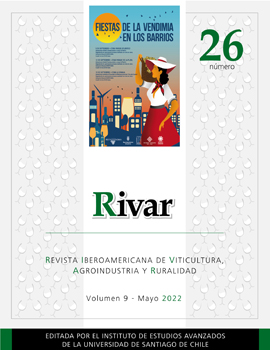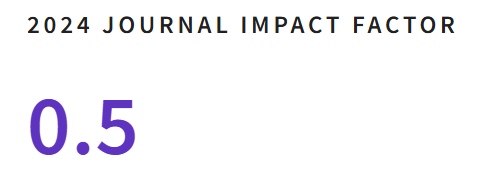Assessment for the Insertion of Agroecological Female Farmers in the Provision of Restaurants
DOI:
https://doi.org/10.35588/rivar.v9i26.5579Keywords:
rural economy, agricultural development, women, marketingAbstract
The objective of this article is a diagnosis regarding the possibilities of insertion of agroecological female farmers in a short supply chain destined for restaurants. To do this, first, interviews were conducted with restaurant owners and managers in the O’Higgins Region, Chile, to identify the requirements they pose to their suppliers. Likewise, surveys and in-depth interviews were conducted with female farmers in the “Madre Tierra Germinando” (“Mother Earth Germinating”, in English) group, located in the Coastal Dryland of the O’Higgins Region. This, is to characterize their current productive and commercial situation, as well as their opinions. Through a chart, the information regarding the requirements of the restaurants and the characteristics and opinions of the female farmers were compared. The diversity and natural origin are an advantage of the female farmers; however, guaranteeing volume in a stable way, as well as transport, are the two requirements whose fulfillment is more complex. However, there is a positive attitude toward collaborative solutions; stable relationships based on mutual knowledge and trust between farmers and restaurants are essential.
Downloads
References
Altieri, MA. (1995). Agroecology: The Science of Sustainable Agriculture. Segunda edición. Colorado, Westview Press.
Benítez, B. et al. (2020). “Empowering Women and Building Sustainable Food Systems: A Case Study of Cuba’s Local Agricultural Innovation Project”. Frontiers for Sustainable Food Systems 5: 554414.
Bergez, JE.; Audouin, E. y Therond, O. (2019). Agroecological Transitions: From Theory to Practice in Local Participatory Design. Nueva York, Springer.
Bezner Kerr, R.; Rahmanian, M.; Owoputi, I. y Batello, C. (2019). “Agroecology and Nutrition: Transformative Possibilities and Challenges”. En Burlingame, B. y Dernini, S. (eds.). Sustainable Diets Lining Nutrition and Food Systems. Wallingford, CABI: 53-63.
BCN (2020). “O’Higgins Reporte comunal”. Reportes comunales. Valparaíso, Biblioteca del Congreso Nacional de Chile.
Boza, S.; Cortés, M.; Muñoz, T.; Rico, M. y Muñoz, J. (2018). “Development Programs for Female Farmers: Identifying Clusters for the Case of Chile’s ‘Education and Training Program for Rural Women’”. Revista de la Facultad de Ciencias Agrarias – UN Cuyo 50(1): 141-155.
Boza, S. y Kanter, R. (2020). “Local Sustainable Diets as a Driver for Transition to Agroecological Food Systems”. Journal of Sustainable and Organic Agricultural Systems – Landbauforschung 70(2): 5-8.
CASEN (2017). Encuesta de caracterización socioeconómica nacional. Santiago de Chile, Ministerio de Desarrollo Social y Familia.
CEPAL (2021). “Implicancias de los roles de género en la gobernanza de los recursos naturales en América Latina y el Caribe”. Recursos Naturales América Latina y el Caribe 2. Santiago de Chile, CEPAL.
Cid, P.; Larenas, E.; Echeverría, C. y Rojas, MA. (2017). Mujeres rurales en Chile: sistematización de algunos elementos. Santiago de Chile, MinMujeryEG.
CIREN (2017). Diagnóstico territorial de la situación hortícola de la región del Libertador Bernardo O’Higgins. Santiago de Chile, CIREN.
Collazos, C. (2019). “El rol de las mujeres en el mundo cooperativo agrícola”. El Mostrador, 17 de octubre de 2019. En https://www.elmostrador.cl/braga/2019/10/17/el-rol-de-las-mujeres-en-el-mundo-cooperativo-agricola/ (consultado 30/05/2022).
Cortés, M.; Montenegro, I.; Boza, S.; Henríquez, JL. y Araya, T. (2017). “La recolección de productos forestales no madereros por mujeres campesinas del sur de Chile: reconfigurando la tensión entre lo local y lo global”. Revista RIVAR 4(12): 22-45.
Díaz-Braco, L.; Torruco-García, U.; Martínez-Hernández, M. y Varela-Ruiz, M. (2013). La entrevista, recurso flexible y dinámico. Ciudad de México, Universidad Nacional Autónoma de México.
FAO (2018). Sistemas territoriales de abastecimento alimentario: propuesta metodológica. Santiago de Chile, FAO.
FAVET (2015). “Diseño y evaluación ex-ante de modelos de negocios en circuitos cortos en Chile”. Serie Estudios y Documentos de Trabajo INDAP N° 4. Santiago de Chile, FAVET.
FUSUPO (2019). Arando la tierra, sembrando cambios. Percepciones y transformaciones socioproductivas del secano costero de la Región de O’Higgins. Santiago de Chile, FUSUPO.
GORE (2009). Estrategia Regional de Desarrollo Región de Los Lagos 2009-2020. Puerto Montt, Gobierno Regional de Los Lagos.
Ilustre Municipalidad Pumanque (2019). Plan de desarrollo comunal de Paredones (PLADECO) 2019-2025. Pumanque, Ilustre Municipalidad de Pumanque.
INDAP (2015). Línea base de los usuarios de INDAP. Informe final. Santiago de Chile, INDAP.
Köbrich, C.; Bravo-Peña, F. y Boza, S. (2019). “Percepción y actitudes de consumidores chilenos respecto a productos de origen campesino: un estudio exploratorio”. Revista RIVAR 6(18): 59-78. DOI https://doi.org/10.35588/rivar.v6i18.4175
Köhler, J. et al. (2019). “An Agenda for Sustainability Transitions Research: State of the Art and Future Directions”. Environmental Innovation and Societal Transitions 31: 1-32.
Marsden, T.; Banks, J. y Bristow, G. (2000). “Food Supply Chains Approaches: Exploring their Role in Rural Development”. Sociologia Ruralis 40: 424-438. DOI https://doi.org/10.1111/1467-9523.00158
Ollivier, G.; Magda, D.; Mazé, A.; Plumecocq, G. y Lamine, C. (2018). “Agroecological Transitions: What Can Sustainability Transition Frameworks Teach Us? An Ontological and Empirical Analysis”. Ecology and Society 23(2): 5. DOI https://doi.org/10.5751/es-09952-230205
Rimisp (2021). “Sistematización de lecciones aprendidas del proceso de desarrollo de Iniciativas a Escala Territorial (IET) en las regiones de O’Higgins, Maule y Biobío-Ñuble”. Documento de trabajo del Proyecto MMA/GEF-PNUD Comunidades Mediterráneas Sostenibles. Santiago de Chile, Rimisp.
____. (2015). Agricultura familiar y circuitos cortos en Chile: situación actual, restricciones y potencialidades. Santiago de Chile, ODEPA.
Rossing, W. et al. (2020). “Transitioning to the Safe and Just Space Inside ‘the Doughnut’ by Means of Agroecological Niche Food Systems: Insights from Chile and Uruguay”. International Journal of Agriculture and Natural Resources 47(3): 295-311. DOI https://doi.org/10.7764/ijanr.v47i3.2258
Ullmann, H.; Maldonado Valera, C. y Rico, MN. (2014). La evolución de las estructuras familiares en América Latina, 1990-2010 Los retos de la pobreza, la vulnerabilidad y el cuidado. Santiago de Chile, CEPAL y UNICEF.
Downloads
Submitted
2022-06-23Published
Versions
- 2024-08-16 (2)
- 2022-05-31 (1)









